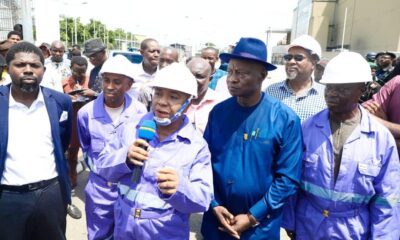Business
Unemployment: ITF Wants Change Of Skills Acquisition Perception
The horrendous unemployment crisis in Nigeria could only be solved with the change of the current perception of skills acquisition as a preserve for the never-do- wells, the poor and the wretched in the society.
If Nigerians successfully change their perception of about technical skills, the problem of unemployment and other development issues would have been half-tackled.
The Director-General of Industrial Training Fund (ITF), Mr. Joseph Ari gave this advise at a briefing in Abuja on the activities of ITF.
Despite government’s best efforts, unemployment was still on the rise.
Painting the gloomy picture of job situation in Nigeria, he said, that projections suggested that the country’s population was expected to hit the 500 million mark by 2050, making it the third most populous country on earth.
“Much as accelerated population growth could be an advantage, it becomes a huge disadvantage and a severe dead weight where this population is neither employed nor equipped with the requisite skills for sustenance.
“And if the current unemployment rate is responsible for the high incidences of violence, criminality and other social vices that are rampant today, it would be safe to conclude that such incidences will conceivably escalate exponentially, if deliberate actions to equip Nigerians with competitive skills for job creation and growth are not taken.”
He explained that some disturbing facts have emerged in a survey, the report of which was presented to stakeholders in Abuja in April this year.
The report, he said, indicated that despite spiraling unemployment, 925 trades were either difficult or hard to fill in the country’s labour market.
“The breakdown showed that 19.7 per cent vacancies were in the housing sector, 13.9 per cent in petro-chemical sector, 14.7 per cent in other goods, 11.4 per cent in the auto industry.
“Others are 10.3 per cent in textiles, 10.1 per cent in steel, 8.9 per cent in the services sector and 3.3 per cent in the leather industry.
“The report also noted that 15.7 per cent of all hard to fill vacancies were due to lack of technical skills, 11.8 per cent due to lack of basic IT skills, 9.2 per cent due to lack of advanced IT skills and between 9.2 per cent and 7.5 per cent of the vacancies were due to the lack of requisite soft skills.”
He said that the report which further corroborated in-house skills gaps surveys of ITF, showed that despite rising unemployment, numerous vacancies still existed in several sectors of the national economy.
These vacancies could not be filled by Nigerians because of the absence of the requisite skills or were being filled by foreigners.
In order to address the problem and stem the spiraling unemployment, President Muhammadu Buhari’s job creation efforts, management came up with a list of implementable programmes for year 2018.
The programmes are aimed at skill acquisition in all the sectors already identified as well as in the building and electrical industry, and agriculture, all on various platforms to train 13,000 Nigerians in five months.
These platforms are the National Industrial Skills Development Programme (NISDP), Women Skills Empowerment Programme (WOSEP), Air-conditioning and Refrigeration (Training on Wheels), and Designing and Garment Making (Training on Wheels) for Nigerian youths.
Others are Skills Training and Empowerment Programme for the Physically Challenged (STEPP-C), Post-Harvest Techniques and Project Development, Aqua-culture/Fish Farming, Manure Production, Crop Production/Greenhouse Technology Poultry farming, Training Programme Development on International Marketing.
In the face of this bleak outlook and in line with our mandate, the fund has also accordingly unveiled one of its most ambitious plans, tagged the “ITF Reviewed Vision: Strategies for Mandate Actualisation”.
“It is a six-year plan divided into Quick wins, medium and long-term goals. The implementation of the plan, which commenced in late 2016 will terminate in 2022.
“The key objectives of the plan was to accelerate the impartation of technical vocational skills to Nigerians, aggressively address service challenges, tackle infrastructural deficits, expand revenue generation and a gamut of other strictures impinging the actualization of the fund’s mandate.
“About two years into its implementation, I am pleased to say that, it has almost exceeded expectation by training over 150,000 Nigerians, who are today earning sustainable livelihoods as paid employees, or as entrepreneurs that are employing others. ”
ITF has expanded the existing skills acquisition programmes and introduced new initiatives.
These programmes include the National Industrial Skills Development Programme (NISDP), the Women Skills Empowerment Programme (WOSEP), Passion to Profession Programme (P2PP), the Skills Training Empowerment Programme for the Physically Challenged (STEPP-C) and the Construction Skills Empowerment Programme (CONSEP) among several others.
In addition, unlike in the past where the ITF depended on state governments to assist trainees with start-up kits, all the beneficiaries of the programme were provided with start-up kits by the fund.
“The essence was to ensure that they started their businesses upon graduation. The decision to provide start-up packs was based on results of our tracer studies of earlier phases, which revealed that in all cases where the trainees were provided with the kits, over 90 percent earned reasonable livelihood as entrepreneurs.”
Business
Eazipay Offers Zero-Interest Loans To 150,000 SMEs, Employees

With a mission to ignite growth, encourage business continuity and help businesses and employees thrive, Eazipay is gearing up to propel the dreams of 150,000 SMEs and employees to new heights through her relief fund.
Gone are the days of financial constraints and stifled dreams. With Eazipay’s support, SMEs and employees alike can bid farewell to limitations and embrace a world of endless possibilities.
Whether it’s start up, business expansion or personal development, Eazipay is here to make dreams come true.
The mind-blowing initiative, which kicked off this month, would end in December, and will also offer a range of perks and benefits designed to put a smile on the faces of SMEs and employees alike.
From exclusive discounts to various advisory services and beyond, Eazipay is committed to spreading happiness and creating lasting impact in people’s lives and to the growth of businesses.
The technology company which offers products and services that range from payroll management to IT/Device management and assessments, “Eazipay isn’t just providing financial support but also unleashing a wave of growth and prosperity for SMEs and employees across the nation.
“Interested businesses and individuals can take part in this initiative directly from the Eazipay website: www.myeazipay.com”.
Business
SMEs Critical For Sustainable Dev – Commissioner

The Commissioner of Finance, Lagos State, Abayomi Oluyomi, has described Small and medium Enterprises (SMEs) as a critical engine for sustainable development in any economy.
He said this recently at the 10th anniversary of the Alert Group Microfinance Bank and the opening of their new head office in Lagos.
According to the National Bureau of Statistics, SMEs accounted for about 50 per cent of Nigeria’s gross.
He commended the positive impact of the Alert MFB as it empowers SMEs in the State.
“Alert MFB in the past 10 years has been at the forefront of empowering SMEs in Lagos State, disbursing over N30bn in loans to over 30,000 individuals having small to medium businesses over that period, which is quite remarkable”, he said.
Speaking, the Group Managing Director of Alert Group, Dr Kazeem Olanrewaju, revealed that the financial institution commenced business in 2013 as a microfinance bank.
“We started this journey in 2013 and it has been expanding. Today, they have about 10 branches across Lagos. They have supported well over 30,000 clients and have disbursed over N30bn.
“The company has been profitable since the second year. Looking at the market and the available opportunity, the Alert MFB board decided to come together to establish a Microfinance Institute (MFI), which is the Auto Bucks Lenders”, Dr. Olanrewaju said.
The GMD further stated that the company was focused more on supporting businesses and small and medium enterprises.
“The loan to support business represents over 98 per cent. The consumer loans you will see are the ones given to entrepreneurs. So, the area of focus of Alert MFB and Auto Bucks Lenders is to support businesses across the country.
“With the establishment of Auto Bucks Lenders, we have the opportunity to also do business outside Lagos. So, presently, we have offices in Ogun State and Oyo State. We intend to go to every part of Nigeria to support what we are doing”, he declared.
Business
Retailers Explain Price Drop In Cement Cost

The cement market, in the last couple of weeks, has seen a significant turnaround with prices tumbling from between N10,000 and N15,000 per 50kg bag to between N7,000 and N8,000.
The sudden rise in the prices of cement and other major building materials in February this year upsets the construction industry, especially in real estate, where many developers were forced to abandon building sites.
A recent market survey conducted by The Tide’s source in different locations across the country confirmed a price drop, ranging between N7,000 and N7,500 per bag, though BUA cement is selling for N7,500 to N7,800 per 50kg bag, depending on location.
Both entrepreneurs and major distributors who were interviewed, explained that the price drop is due to low demand and government’s intervention.
At the peak of the price hike, the Federal Government called a meeting with major producers where it was agreed that a bag of cement should be between for N7,000 to N8,000, depending on location.
But the producers did not comply with this agreement immediately, followin which “Nigerians stopped demanding for cement; many project sites were abandoned as developers sat back and waited for the prices to come down.
“So, what has happened is an inter-play of demand and supply with price responding, which is Economics at work”, Collins Okpala, a cement dealer, told the source in Abuja.
In the Nyanya area of the Federal Capital Territory, a 50-kg bag of Dangote cement now sells for between N7,000 and N7,500, while BUA cement sells for between N8,500 and N9,500, down from between N11,000 and N12,000 respectively.
In Lagos, the product has seen significant price drop too. In Ojo area of the state, Sebastin Ovie, a dealer, told our reporter that what has happened is a crash from the January price, attributing the crash to low demand and stronger naira.
“The current price of the product is between N7,000 and N7,500 per 50kg bag, depending on the brand. This is a significant drop from the average of N12,000 which most dealers were selling in February and March”, he said.
A dealer in Agege area of the state who identified himself as Taofik Olateju, told the source that sales are picking up due to the drop in price.
He recalled that Nigerians at a point stopped buying due to the high price of the product at N15,000 per bag.
“I am sure most dealers ran at a loss then because we had mainly old stocks which we wanted to offload quickly”, he said, confirming that the product sells for between N7,500 and N8,000, depending on the brand and the demand for the brand.
Continuing, Olateju noted that “because the naira is now doing well against the dollar, it will be unreasonable for manufacturers to continue to sell the product at the old prices. I also believe that the federal government’s intervention and the threat to license more importers may have worked, leading to the reduction in price”.
In Enugu, the source reports that the product sells for between N7,200 and N7,500 depending on the brand and location.
“This is a city where the price of a 50kg bag went for as high as N12,000 and N13,000 in some cases in February and March”, Samuel Chikwendu said.
He added that the prices of other building materials, especially iron rods, have also dropped considerably which is why, he said, activities are picking up again at construction sites.
The story is slightly different in Owerri, the capital of Imo State, where Innocent Okonkwo told the source that low demand was also driving the price drop, adding that a 50kg bag was selling for N9,000 on the average in the state.
Sundry market observers are optimistic of further price reductions, but they remain cautious as manufacturers, wholesalers, and retailers continue to play critical roles in setting prices for end-users.
They lamented, however, that despite Nigeria’s status as one of the largest producers of cement in Africa, the price of the product continues to rise, particularly in the face of high inflation impacting the building materials market generally.
Okpala in Abuja highlighted the variations arising from direct sourcing from manufacturers versus procurement through dealers, with traders holding old stocks selling products at prices ranging from N8,500, N8,300 to N8,000 per bag.
Lucy Nwachukwu, another dealer in Abuja, said the significance of procurement volume in determining cement costs, noting that stability in prices has been observed over the past month, with the product retailing for between N7,000 and N7,800 depending on the brand.
In Port Harcourt also, a customer, Daniel Etteobong Effiong, said the price goes between N7500 to N8500, depending on the brand and the location one is buying from.
-

 News3 days ago
News3 days agoBonny-Bodo Road: FG Offers Additional N20bn, Targets December Deadline
-
Business3 days ago
Nigeria Set To Get $2.25bn World Bank Loan … Plans Diaspora Bond
-

 Niger Delta3 days ago
Niger Delta3 days agoMile One Market: Committee Commences Verification Exercise …Denies Allocations Of Shops
-
Sports3 days ago
Chairman Lauds NPFL Referees Improvement
-

 News3 days ago
News3 days agoJAMB Arrests Father For Impersonating Son At Exam Centre
-
Women3 days ago
The Desire Of Every Woman In Marriage
-

 Featured3 days ago
Featured3 days agoBe Firm In Fight Against Oil Theft, Fubara Tells CNS …As Navy Moves Training Hqtrs To Rivers …Seizes 14 Vessels In Three Months
-
Business3 days ago
Diri Tasks NCDMB, SPDC On Projects Completion

